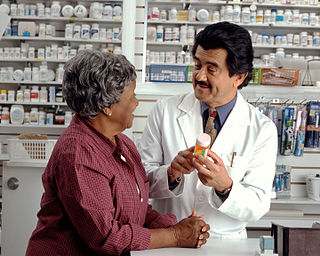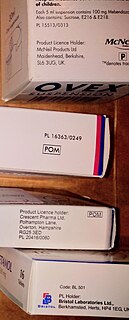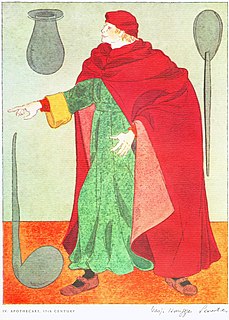
Over-the-counter (OTC) drugs are medicines sold directly to a consumer without a prescription from a healthcare professional, as opposed to prescription drugs, which may be sold only to consumers possessing a valid prescription. In many countries, OTC drugs are selected by a regulatory agency to ensure that they contain ingredients that are safe and effective when used without a physician's care. OTC drugs are usually regulated according to their active pharmaceutical ingredient (API) rather than final products. By regulating APIs instead of specific drug formulations, governments allow manufacturers the freedom to formulate ingredients, or combinations of ingredients, into proprietary mixtures.

Pharmacists, also known as chemists or druggists, are health professionals who practice in pharmacy, the field of health sciences focusing on safe and effective medication use. Pharmacists undergo university-level education to understand the biochemical mechanisms and actions of drugs, drug uses, therapeutic roles, side effects, potential drug interactions, and monitoring parameters. This is mated to anatomy, physiology, and pathophysiology. Pharmacists interpret and communicate this specialized knowledge to patients, physicians, and other health care providers.

A prescription drug is a pharmaceutical drug that legally requires a medical prescription to be dispensed. In contrast, over-the-counter drugs can be obtained without a prescription. The reason for this difference in substance control is the potential scope of misuse, from drug abuse to practicing medicine without a license and without sufficient education. Different jurisdictions have different definitions of what constitutes a prescription drug.
Pharmaceutics is the discipline of pharmacy that deals with the process of turning a new chemical entity (NCE) or old drugs into a medication to be used safely and effectively by patients. It is also called the science of dosage form design. There are many chemicals with pharmacological properties, but need special measures to help them achieve therapeutically relevant amounts at their sites of action. Pharmaceutics helps relate the formulation of drugs to their delivery and disposition in the body.
Pharmaceutics deals with the formulation of a pure drug substance into a dosage form.
Branches of pharmaceutics include:
A pharmacy technician is a health care provider who performs pharmacy-related functions, generally working under the direct supervision of a licensed pharmacist. Pharmacy technicians work in a variety of locations, but can also work for long-term care facilities, pharmaceutical manufacturers, third-party insurance companies, computer software companies, or in government or teaching. Job duties include dispensing prescription drugs and other medical devices to patients and instructing on their use. They may also perform administrative duties in pharmaceutical practice, such as reviewing prescription requests with doctor's offices and insurance companies to ensure correct medications are provided and payment is received.

Apothecary is one term for a medical professional who formulates and dispenses materia medica to physicians, surgeons, and patients. The modern pharmacist has taken over this role. In some languages and regions, the word "apothecary" is still used to refer to a retail pharmacy or a pharmacist who owns one. Apothecaries' investigation of herbal and chemical ingredients was a precursor to the modern sciences of chemistry and pharmacology.
A source document is a document in which data collected for a clinical trial is first recorded. This data is usually later entered in the case report form. The International Conference on Harmonisation of Technical Requirements for Registration of Pharmaceuticals for Human Use (ICH-GCP) guidelines define source documents as "original documents, data, and records." Source documents contain source data, which is defined as "all information in original records and certified copies of original records of clinical findings, observations, or other activities in a clinical trial necessary for the reconstruction and evaluation of the trial."

The Pharmacists' Defence Association is a not-for-profit membership organisation that supports the needs of individual pharmacists, pharmacy students and pharmacy undergraduates in the United Kingdom. Membership of the PDA includes insurance, union membership and defence association benefits, which all aim to assist and support pharmacists in their working lives. In November 2018, the PDA reported having more than 28,000 members. in the United Kingdom.
A veterinary pharmacist is a specially trained pharmacist who dispenses veterinary drugs and supplies or products and advice to owners of companion animals and livestock.

Remote dispensing is used in health care environments to describe the use of automated systems to dispense prescription medications without an on-site pharmacist. This practice is most common in long-term care facilities and correctional institutions that do not find it practical to operate a full-service in-house pharmacy.
Pharmacy automation involves the mechanical processes of handling and distributing medications. Any pharmacy task may be involved, including counting small objects ; measuring and mixing powders and liquids for compounding; tracking and updating customer information in databases ; and inventory management. This article focuses on the changes that have taken place in the local, or community Pharmacy since the 1960s.
The Pharmacy Guild of Australia is the Pharmacy Owners' representative, but not the Pharmacy Profession body.
An automated dispensing cabinet (ADC) is a computerized drug storage device or cabinet designed for hospitals. ADCs allow medications to be stored and dispensed near the point of care while controlling and tracking drug distribution. They also are called unit-based cabinets (UBCs), automated dispensing devices (ADDs), automated distribution cabinets or automated dispensing machines (ADMs).
Pharmacy2U is an online mail-order pharmacy located in the UK. The company was founded by pharmacist Daniel Lee in 1999. Pharmacy2U has been involved in piloting the electronic transfer of prescriptions in the UK.

Telepharmacy is the delivery of pharmaceutical care via telecommunications to patients in locations where they may not have direct contact with a pharmacist. It is an instance of the wider phenomenon of telemedicine, as implemented in the field of pharmacy. Telepharmacy services include drug therapy monitoring, patient counseling, prior authorization and refill authorization for prescription drugs, and monitoring of formulary compliance with the aid of teleconferencing or videoconferencing. Remote dispensing of medications by automated packaging and labeling systems can also be thought of as an instance of telepharmacy. Telepharmacy services can be delivered at retail pharmacy sites or through hospitals, nursing homes, or other medical care facilities.
Pharmacy in the United Kingdom has been an integral part of the National Health Service since it was established in 1948. Unlike the rest of the NHS pharmacies are largely privately provided apart from those in hospitals, and even these are now often privately run.
Separation of prescribing and dispensing, also called dispensing separation, is a practice in medicine and pharmacy in which the physician who provides a medical prescription is independent from the pharmacist who provides the prescription drug.
The pharmacy management system, also known as the pharmacy information system, is a system that stores data and enables functionality that organizes and maintains the medication use process within pharmacies.










